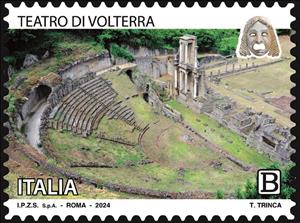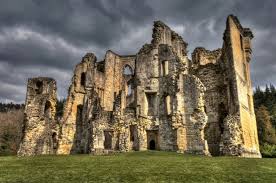Stamp: Roman Theater of Volterra (Italy 2024)
Roman Theater of Volterra (Italy 2024)
16 April (Italy ) within release Ancient Theaters (2024) goes into circulation Stamp Roman Theater of Volterra face value B No Face Value
| Stamp Roman Theater of Volterra in catalogues | |
|---|---|
| Colnect codes: | Col: IT 2024.04.16-03 |
Stamp is horizontal format.
Face Value € 1.25 on day of issueAlso in the issue Ancient Theaters (2024):
- Stamp - Greek Theater of Syracuse face value B;
- Stamp - Roman Theater of Lecce face value B;
- Stamp - Roman Theater of Segesta face value B;
- Stamp - Roman Theater of Suasa face value B;
- Stamp - Roman Theater of Volterra face value B;
Stamp Roman Theater of Volterra it reflects the thematic directions:
Archaeology or archeology[a] is the study of human activity through the recovery and analysis of material culture. The archaeological record consists of artifacts, architecture, biofacts or ecofacts, sites, and cultural landscapes. Archaeology can be considered both a social science and a branch of the humanities. It is usually considered an independent academic discipline, but may also be classified as part of anthropology (in North America – the four-field approach), history or geography
Ruins (from Latin ruina 'a collapse') are the remains of a civilization's architecture. The term refers to formerly intact structures that have fallen into a state of partial or total disrepair over time due to a variety of factors, such as lack of maintenance, deliberate destruction by humans, or uncontrollable destruction by natural phenomena. The most common root causes that yield ruins in their wake are natural disasters, armed conflict, and population decline, with many structures becoming progressively derelict over time due to long-term weathering and scavenging.
Theatre or theater is a collaborative form of performing art that uses live performers, usually actors or actresses, to present the experience of a real or imagined event before a live audience in a specific place, often a stage. The performers may communicate this experience to the audience through combinations of gesture, speech, song, music, and dance. It is the oldest form of drama, though live theatre has now been joined by modern recorded forms. Elements of art, such as painted scenery and stagecraft such as lighting are used to enhance the physicality, presence and immediacy of the experience. Places, normally buildings, where performances regularly take place are also called "theatres" (or "theaters"), as derived from the Ancient Greek θέατρον (théatron, "a place for viewing"), itself from θεάομαι (theáomai, "to see", "to watch", "to observe").



